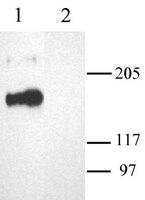Assembly of presynaptic active zones from cytoplasmic transport packets.
Ahmari, S E, et al.
Nat. Neurosci., 3: 445-51 (2000)
2000
显示摘要
Little is known about presynaptic assembly during central nervous system synaptogenesis. Here we used time-lapse fluorescence imaging, immunocytochemistry and electron microscopy to study hippocampal neuronal cultures transfected with a fusion construct of the presynaptic vesicle protein VAMP and green fluorescent protein. Our results suggest that major cytoplasmic and membrane-associated protein precursors of the presynaptic active zone are transported along developing axons together as discrete packets. Retrospective electron microscopy demonstrated varied vesicular and tubulovesicular membrane structures. Packets containing these heterogeneous structures were stabilized specifically at new sites of dendrite- and axon-initiated cell-cell contact; within less than one hour, evoked vesicle recycling was observed at these putative nascent synapses. These observations suggest that substantial membrane remodeling may be necessary to produce the uniform vesicles typical of the mature active zone, and that many presynaptic proteins may be united early in their biogenesis and sorting pathways. | 10769383
 |
Voltage-dependent Ca(2+) channel subunit expression and immunolocalization in mouse spermatogenic cells and sperm.
Serrano, C J, et al.
FEBS Lett., 462: 171-6 (1999)
1999
显示摘要
Though voltage-dependent Ca(2+) channels contribute to the orchestration of sperm differentiation and function, many questions remain concerning their molecular architecture. This study shows that alpha(1A) and alpha(1C) Ca(2+) channel pore-forming subunits are expressed in spermatogenic cells. In addition, it provides what is to our knowledge the first evidence for the presence of the Ca(2+) channel beta auxiliary subunits in spermatogenic cells and sperm. Using RT-PCR we demonstrated the expression of all four known genes encoding the beta subunits in spermatogenic cells. Specific antibodies detected three of these proteins in spermatogenic cells and sperm. In spermatogenic cells both alpha(1) and beta subunits are diffusely distributed throughout the cytoplasm while in sperm they appear to be regionally localized. | 10580114
 |












